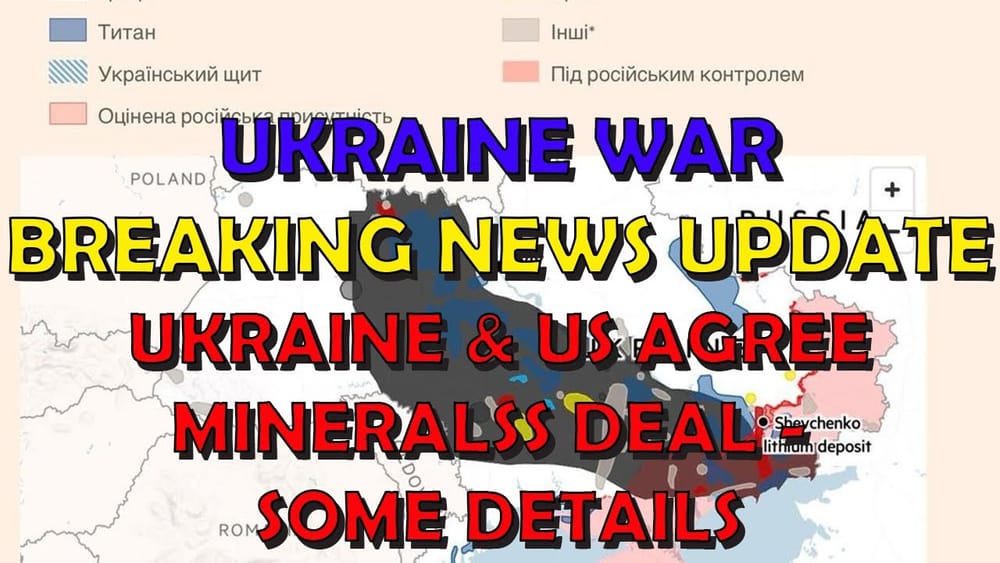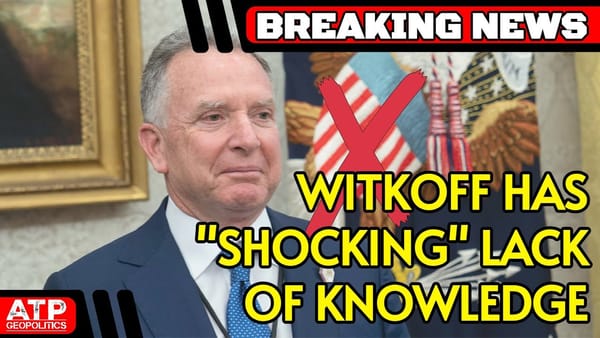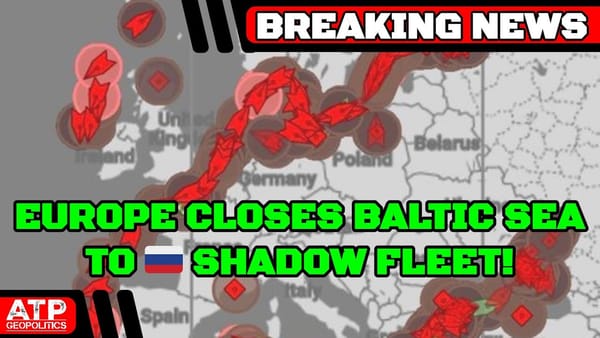Ukraine War BREAKING NEWS: US-Ukraine Minerals Deal Agreed - Some Details
Table of Contents 📖
"And that shows the strength of Zelensky as a negotiator and the idea that, you know, the U.S. will come up with these bombastic ideas, but you need to be strong in the face of them and they will back down."
Hello Team
🎦 00:00-00:29⏩
- Jonathan welcomes viewers to ATP Geopolitics for a Ukraine war breaking news update.
- He mentions news regarding a minerals deal between the US and Ukraine.
- Documents related to the deal have been released or leaked.
- The deal, initially perceived as extortionate, has undergone changes through negotiations.
Context of US-Ukraine Minerals Deal
🎦 00:29-00:53⏩
- Jonathan believes the current iteration of the deal is significantly better for Ukraine than initially proposed.
- He raises the question of whether it still constitutes a form of extortion, suggesting it's debatable.
- The agreement requires ratification by the Verkhovna Rada, the Ukrainian parliament.
Details of US-Ukraine Investment Fund for Reconstruction of Ukraine
🎦 00:53-01:14⏩
- According to the Ukrainian Review, the deal involves creating an investment fund for Ukraine's reconstruction.
- The fund will be managed jointly by Ukraine and the US on an equal footing.
- Ukraine will contribute 50% of revenues from the monetization of natural resources (oil, gas, minerals, infrastructure) to this fund.
- The US will also make contributions to the fund.
- The fund's purpose is to invest in the development of Ukraine.
Fund is different from US extraction of $500bn value
🎦 01:14-01:28⏩
- Jonathan highlights that this fund structure is very different from initial reports suggesting the US would extract $500 billion worth of value from Ukrainian resources.
- This revised approach seems more favourable to Ukraine.
Agreement legally binding and linked to security guarantees
🎦 01:28-01:43⏩
- The Null Report indicates that Ukraine and the US have finalised an agreement on a rare earth investment fund for Ukraine's reconstruction.
- The fund will be jointly managed by both countries.
- Crucially, the agreement is legally binding and directly linked to security guarantees for Ukraine.
Lack of clarity on security guarantees attached
🎦 01:43-01:52⏩
- Jonathan points out that there is still a lack of clarity regarding whether security guarantees are definitively attached to this agreement.
- The nature and extent of these security guarantees are not yet fully defined.
Ukrainian government to review agreement, aligned with EU deals
🎦 01:52-02:14⏩
- The Ukrainian government is scheduled to review the text of the agreement.
- Prime Minister Denys Shmyhal stated that the agreement aligns with Ukraine's European integration goals and avoids conflicts with EU commitments.
- This alignment with EU standards is considered important.
Zelensky initiated deal, Ukraine negotiated agreeable terms
🎦 02:14-02:33⏩
- Ukrainian sources suggest that Ukraine negotiated more agreeable terms in the minerals deal with the US.
- It is reported that President Zelensky initiated the deal.
- Jonathan expresses hope that Zelensky has secured beneficial terms for Ukraine's future, beyond just addressing past issues.
Zelensky to fly to Washington to sign deal
🎦 02:33-02:54⏩
- President Zelensky is expected to travel to Washington to sign the minerals deal.
- Jonathan notes that Ukraine had to resort to such a deal, implying it is not ideal but potentially necessary in the current circumstances.
- However, he acknowledges elements suggesting Ukraine has managed to make it a more beneficial agreement.
Zelensky's negotiation strength, US backs down to strong retorts
🎦 02:54-03:20⏩
- Jonathan attributes the improved deal to Zelensky's strength as a negotiator.
- He suggests that the US, despite initial strong proposals, can back down when faced with firm resistance.
- This dynamic is compared to observations about Donald Trump, who was also said to back down to strong responses.
Ukraine's PM gives details: Ukraine Reconstruction Investment Fund, implied security guarantees
🎦 03:20-03:44⏩
- Tim White reports that Ukraine's Prime Minister Shmyhal provided more details about the mineral deal.
- The agreement is now officially termed the "Agreement establishing the terms and conditions of the Ukraine Reconstruction Investment Fund".
- Shmyhal indicated that there are "implied" security guarantees for Ukraine associated with the agreement.
Implied security guarantees are a worry
🎦 03:44-03:50⏩
- Jonathan expresses concern about the term "implied security guarantees".
- He notes a significant difference between "implied" and "legally binding" security guarantees, suggesting "implied" guarantees are less reassuring.
Ukraine and US finalised rare earths agreement, now Reconstruction Investment Fund, PM statement
🎦 03:50-04:09⏩
- RBK reports that Ukraine and the US have effectively finalised the rare earths agreement.
- The agreement is now officially named "Agreement establishing the terms and conditions of the Ukraine Reconstruction Investment Fund".
- This information was confirmed by Prime Minister Shmyhal during a national telethon.
Final version of agreement, preliminary with legal force, joint fund management
🎦 04:09-04:27⏩
- Shmyhal is quoted stating that a "final version" of the agreement has been developed.
- He describes it as a "preliminary agreement" that will have legal force.
- The agreement establishes an investment fund for Ukraine's reconstruction, to be jointly managed and filled by Ukraine and the US.
Agreement related to Ukraine security guarantees
🎦 04:27-04:37⏩
- According to Shmyhal, the agreement is directly related to Ukraine's security guarantees.
- He emphasises that neither President Zelensky nor the Cabinet of Ministers would consider the agreement without this link to security guarantees.
Preamble mentions US desire to invest in secure Ukraine, security priority
🎦 04:37-05:05⏩
- Jonathan quotes the preamble of the agreement, which mentions the "desire of the American people to invest together with Ukraine in a free sovereign and secure state".
- Shmyhal stresses that the security aspect of this agreement is the number one priority for the Ukrainian government and president.
- This preamble highlights the importance of security within the agreement's context.
Security guarantees are forefront, legality and explicitness to be seen
🎦 05:05-05:23⏩
- Jonathan interprets Shmyhal's statements as indicating that security guarantees are at the forefront of this agreement.
- He expresses interest in seeing how these security guarantees will be manifested in the final agreement.
- He questions how legally binding and explicit these guarantees will ultimately be.
Agreement references Budapest Memorandum, Ukraine's nuclear disarmament
🎦 05:23-05:34⏩
- The article mentions that the agreement references the Budapest Memorandum.
- The Budapest Memorandum emphasizes Ukraine's contribution to international security by giving up the third-largest nuclear arsenal in the world.
- Jonathan finds this reference significant and believes it has not received enough attention.
Budapest Memorandum signatories' security responsibility, US backtracking, leverage
🎦 05:34-06:16⏩
- Jonathan explains that the Budapest Memorandum was signed by countries including the US, who legally committed to providing security to Ukraine in exchange for nuclear disarmament.
- He points out that one signatory (Russia) has attacked Ukraine, thus obligating other signatories to provide assistance.
- He speculates whether the US has used the Budapest Memorandum as leverage in these mineral deal negotiations, reminding Ukraine of the US's legal obligations.
Document to be agreed between US and Ukrainian Presidents
🎦 06:16-06:29⏩
- The document is expected to be considered by the Ukrainian government and then finalised during negotiations between the Presidents of Ukraine and the US.
- This highlights the high-level nature of the agreement and the involvement of both presidents.
Key provisions: joint fund management, security guarantees, NATO accession support
🎦 06:29-06:43⏩
- Key provisions of the agreement include:
- Creation of an investment fund.
- Joint management of the fund by Ukraine and the US.
- Linkage to security guarantees.
- Inclusion as part of the security architecture supporting Ukraine's accession to NATO or alternative security guarantees.
Fund financing: 50% of Ukraine's mineral revenues, joint contributions, recovery and security
🎦 06:43-07:00⏩
- Fund financing details:
- 50% of Ukraine's revenues from mineral rents or licenses and infrastructure dividends will be directed to the fund.
- Joint contributions from the US and Ukraine.
- Funds will be invested in the recovery, economy and security of Ukraine.
Recognition of Ukraine's security contribution, Budapest Memorandum, joint management, PM quote
🎦 07:00-07:22⏩
- The agreement includes:
- Recognition of Ukraine's contribution to international security.
- Reference to Ukraine's abandonment of its nuclear arsenal.
- Reference to the Budapest Memorandum.
- Joint management of the fund by both governments.
- Jonathan quotes Denys Shmyhal again, reiterating the importance of these points.
- Jonathan expresses anticipation to see the finer details of the agreement and whether Zelensky has successfully persuaded the US to concede on its initial demands.
Zelensky got US to back down on stringent demands
🎦 07:22-07:31⏩
- Jonathan reiterates the apparent backing down of the US from its most stringent initial demands regarding the minerals deal, suggesting a win for Zelensky's negotiation.
Detail still lacking
🎦 07:31-07:40⏩
- Despite the positive developments, Jonathan notes that significant details of the agreement are still lacking and need to be clarified.
Garage door being fixed
🎦 07:40-07:50⏩
- Jonathan apologises for background noise, explaining that his garage door is being repaired.
- This is a brief, lighthearted interjection unrelated to the main topic.
Speculation: Trump might demand Finland/Sweden NATO exclusion for Kremlin deal
🎦 07:50-08:12⏩
- Jonathan shifts to speculative news from a Finnish political scientist, Jussi Lasilla.
- Lasilla theorises that Trump might demand the exclusion of Finland and Sweden from NATO as part of a deal with the Kremlin.
- Juergen Naudit supports this, stating it aligns with Moscow's main demands, including returning NATO to 1997 borders.
Moscow's demand: NATO to 1997 borders, US-Russia negotiations, deconstruction of NATO?
🎦 08:12-08:27⏩
- Moscow's demand for NATO to return to 1997 borders could be a key element in US-Russia negotiations.
- Jonathan speculates whether this could lead to a "deconstruction of NATO" and a "reconstruction" into a European NATO without US involvement.
US unreliable ally, European NATO, Russia might accept
🎦 08:27-08:44⏩
- The idea of a European NATO arises from the perception of the US becoming an "unreliable ally".
- Jonathan suggests Russia might accept a new European security alliance (non-NATO) as it wouldn't be considered NATO expansion.
New security arrangement to deal with
🎦 08:44-08:48⏩
- Jonathan concludes this speculation by stating that a new security arrangement, if it emerges, would be something nations would have to adapt to and "deal with".
Original racketeering deal now bipartisan, not repayment for aid, justification for others
🎦 08:48-09:17⏩
- Jonathan reflects on the minerals deal, noting its transformation from what initially appeared to be "racketeering, protection racketeering and extortion".
- It now resembles a bipartisan deal that does not seem to be a direct repayment for aid to Ukraine.
- This is positive as it hopefully prevents other nations from demanding similar repayments for their aid to Ukraine.
Ukraine can't repay all aid, Slovakia example, US initial demands
🎦 09:17-09:34⏩
- Jonathan argues that Ukraine would be unable to cope with demands for repayment of all aid received.
- He uses Slovakia as an example of a nation that might make similar demands to the US's initial approach.
- He reiterates that Ukraine avoiding the initial US demands is a positive outcome.
Wrap up
🎦 09:34-09:36⏩
- Jonathan thanks viewers for watching and concludes the video.




